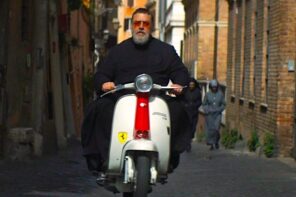Every week, something new comes out about Pope Francis that gives us hints about who he is. The most recent revelation comes after comments he made at a working class church San Cirillo Allessandro, on the outskirts of Rome on the first Sunday of Advent.
According to L’Osservatore Romano, the Pope told parishioners he had once been a bouncer, but that his work later in life teaching psychology and literature taught him how to get people back into the church.
No surprise then, that Pope Francis is punching high and low at his internal and external detractors. Like a young Mohammed Ali, he is floating like a butterfly and stinging like a bee when it comes to bringing the church back to its core message. And it is working.
The Pope’s latest statement, Evangelii Gaudium, is a papal exhortation designed to promote evangelism in the Catholic Church. Most media outlets are not emphasizing the evangelism element, but are paying close attention to the pope’s criticism of the current economic system as “unjust at its very root,” and the Social Darwinism that pervades our societies.
Even President Obama found occasion to quote Pope Francis in his speech on fighting poverty at the beginning of the month.
For some conservatives, Pope Francis is a heretic. Jonathon Moseley declared in WorldNet Daily that “Jesus was a capitalist, preaching personal responsibility, not socialism . Others, including Sarah Palin, Rush Limbaugh and Pamela Geller, have expressed their disdain for the Pope’s critique of capitalism.
(When Rush Limbaugh accuses Pope Francis of “pure Marxism coming out of his mouth” and speculates that “someone must have gotten to the Pope,” well…maybe that’s Jesus he’s talking about. You know, that guy who talked about the poor “you will always have with you.”)
While the right is bleating about how radical Pope Francis is, it is important to remember what order Pope Francis belongs to—he is a Jesuit. In 1968 Jesuit General Fr. Pedro Arrupe used the phrase “a preferential option for the Poor,” an idea famously expanded upon by Fr. Gustavo Gutierrez in 1973’s Theology of Liberation. This “option for the poor,” then, has been an important part of Francis, then-Bergolio’s life—even though his take on Liberation Theology never went as Marxist as Rush Limbaugh might think it is.
No surprise, too, that the Pope has so far been relentless in emphasizing unjust systems and poverty. It is not only his Jesuit identity, but his identity as a Latin American Catholic.
I believe that there is a very important takeaway from Evangelii Gaudium and its reception: Pope Francis is a Pope, unlike Pope Benedict XVI, who wants to engage the world, but also to critique the world. And he is not waiting for the traditional Urbi Et Orbi Message of Christmas to do so.
While some see the exhortation as calling for drastic reforms in the church, I believe it is more of a document calling the Catholic church back to its fundamental mission of evangelism and piety. Pope Francis may be unassuming about his office, yet he understands his mission: to right a sinking ship of Catholicism and get everyone’s attention off of the money scandals, the sexual abuse scandals, and all of the other problems facing the church. He is, after all the head of a corporation, one that has many of the same internal structural justice issues he is critical of in the world. The Vatican is not the Pope, and he knows it. Reforming the Curia, and reforming the world are two very different things. (Truthfully, reforming the world might be an easier task.)
Righting the Vatican is a enormous task. While Evangelii Gaudium is a good beginning, the more compelling action taken by the Vatican last week was the implementation of a task force for the protection of children. Suggested by the council of eight Cardinals the Pope has appointed, it remains to be seen whether or not the task force will be a serious effort, or another smokescreen to cover up the horrible crimes committed upon children.
While Pope Francis is doing an excellent job engaging the world and gathering admirers (and Twitter followers), the real test of his papacy rests not in the hype he can produce, but in his ability to repair the grave damage done to Catholics around the world in recent years. It is hard to believe “the joy of the Gospel” when the institution and its followers have been so tainted and troubled.
Judgment, as scripture says, begins with the house of God.




